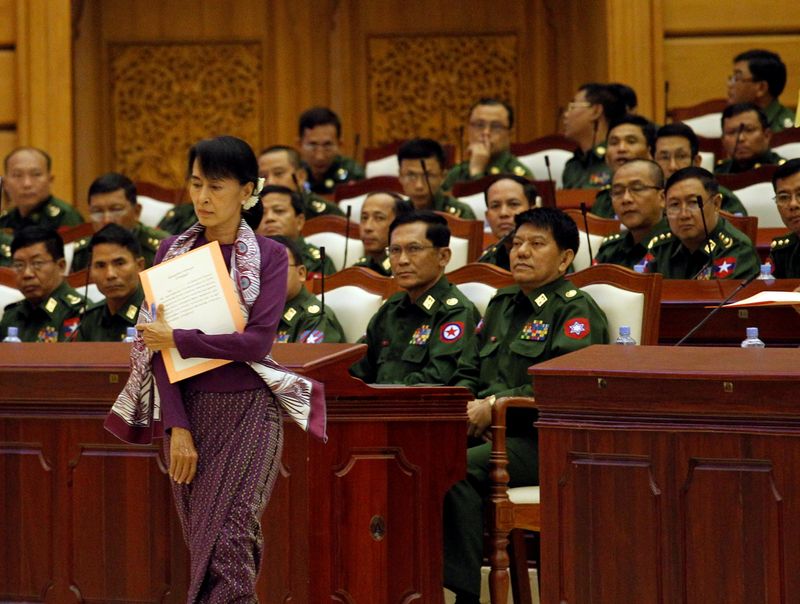(Reuters) - Aung San Suu Kyi, who spent 15 years under house arrest in the struggle to bring democracy to Myanmar, has been detained along with other leaders of her political party in a military coup.
Beloved in Myanmar as "the Lady", Suu Kyi fulfilled the dreams of millions when her party won a landslide election in 2015 that established the Southeast Asian nation’s first civilian government in half a century.
But the Nobel laureate appalled the world two years later by denying the extent of a sweeping military-led crackdown against the Rohingya Muslim minority which forced hundreds of thousands to flee the country.
In Myanmar, Suu Kyi remains adored but she has failed to unite its myriad ethnic groups or end its decade-long civil wars. She also oversaw tightening restrictions on the press and civil society and has fallen out with many former allies.
The daughter of independence hero Aung San, who was assassinated in 1947 when she was two years old, Suu Kyi spent much of her young life overseas. She attended Oxford University, met her husband, the British academic Michael Aris, and had two sons.
Before they married, she asked Aris to promise he would not stop her if she needed to return home. In 1988, she got the phone call that changed their lives: her mother was dying.
In the capital Yangon, then Rangoon, she was swept up in a student-led revolution against the military junta that had seized power after her father’s death and plunged the country into a ruinous isolation.
Suu Kyi, the spitting image of the idolized Aung San and an eloquent public speaker, became the leader of the new movement, quoting her father’s dream to "build up a free Burma".
The revolution was crushed, its leaders killed and jailed, and Suu Kyi was imprisoned in her lakeside family home. Speaking her name in public could earn her supporters a prison sentence, so they called her "the Lady".
Slightly built and soft-spoken, she played a crucial role in keeping world attention on Myanmar’s military junta and its human rights record, winning the Nobel Peace Prize in 1991. Aris died in 1997 but she did not attend his funeral, fearful she would not be allowed to return.
For years, the army led a relentless smear campaign against Suu Kyi, whom they dubbed an “axe-handle of the West”.
During a brief release from house arrest in 1998 she attempted to travel outside Yangon to visit supporters and was blocked by the army. She sat inside her van for several days and nights, despite dehydration in the sweltering heat, and was said to have caught rainwater in an open umbrella.
She survived an assassination attempt in 2003 when pro-military men wielding spikes and rods attacked a convoy she was travelling in. Some of her supporters were killed or badly wounded.
The army again placed her under house arrest and from behind the gates, she gave witty weekly addresses to supporters, standing on rickety tables and talking about human rights and democracy under the watchful eyes of secret police. A devout Buddhist, she sometimes spoke of her struggle in spiritual terms.
FROM REVERED TO REVILED
In 2010, the military began a series of democratic reforms and Suu Kyi was released before thousands of weeping, cheering supporters.
In the West, she was feted. Barack Obama became the first U.S president to visit Myanmar in 2012, calling her an “inspiration to people all around the world, including myself”. U.S economic sanctions on Myanmar were eased, though Suu Kyi remained cautious about the extent of reforms.
With the 2015 election win, Suu Kyi became state counsellor, pledging to end civil war, boost foreign investment and reduce the army’s role in politics. She also promised Western allies she would address the plight of the Rohingya who had borne the brunt of violent clashes with Buddhists, with hundreds of thousands detained in internment camps.
In August 2017, Rohingya militants attacked security forces and the military responded by burning hundreds of villages to the ground and carrying out mass killings and gang rapes. The United Nations said it was conducted with “genocidal intent”.
Suu Kyi said the military was exercising "rule of law" and appeared baffled and ignorant about the exodus of refugees. And while she had no power to direct the army operation, her government ordered burned land become government-owned land and oversaw the bulldozing of destroyed villages.
Global institutions and former advocates including the Dalai Lama publicly denounced her and many of the numerous accolades awarded to her were rescinded.

In 2019, she flew to the Hague to face charges of genocide at the International Court of Justice. She acknowledged the possibility war crimes had been committed but framed the crackdown as a legitimate military operation against terrorists.